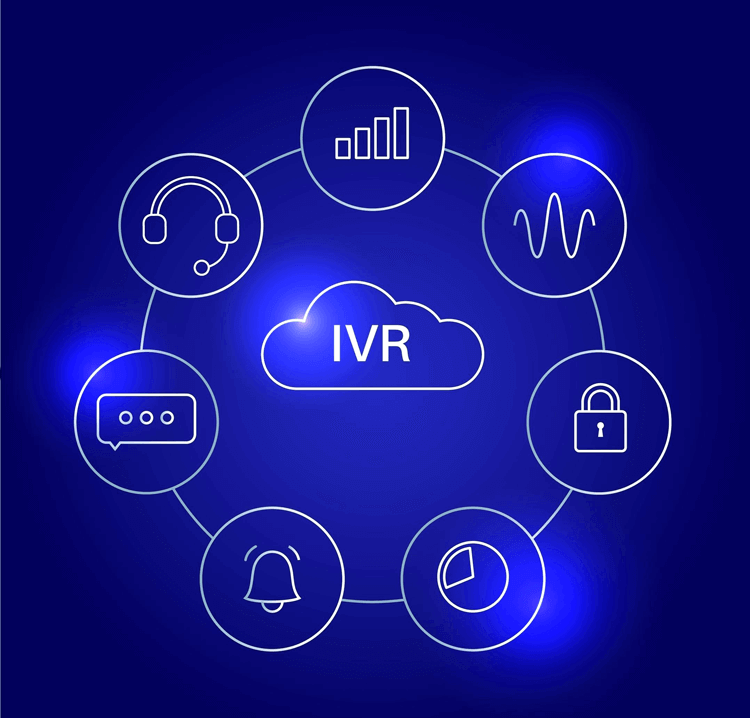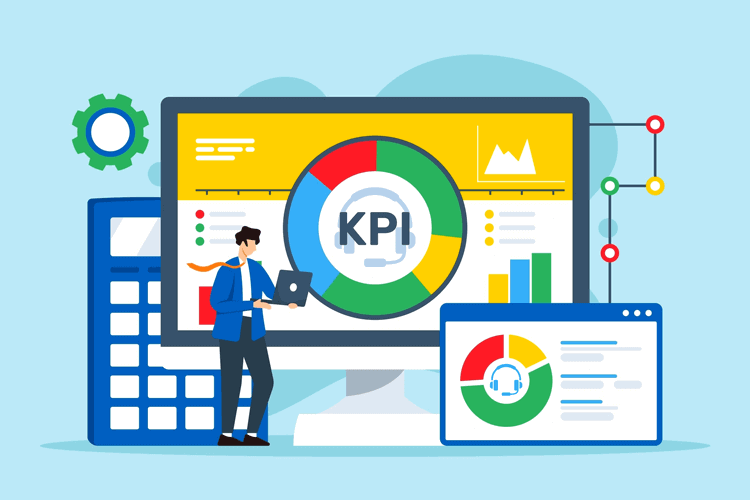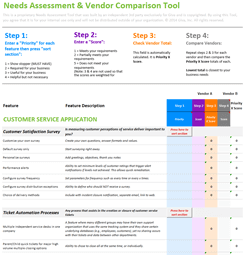Top 8 Interactive Voice Response (IVR) Benefits for Call Centers
Interactive Voice Response (IVR) systems are a mission-critical component of call centers and customer service operations.
As businesses face ever-growing customer expectations, and higher call volumes because there are fewer telephony staff, IVR offers a reliable, cost-effective, and scalable way to help customers right away.
In this article, we explain what IVR is, how it is used across different sectors, and the top 8 IVR benefits to call centers and operations managers.

What is Interactive Voice Response (IVR)?
Interactive Voice Response (IVR) is an automated telephony system that interacts with callers through voice recognition and keypad inputs. If you've ever called a call center, then the voice that guides you through menu items, and tells you how busy they are is the IVR. It would seem odd to call any kind of centralized customer service operation that didn't have an IVR.
IVRs use pre-recorded messages that are now often integrated with Artificial Intelligence (AI) capabilities and speech recognition technologies.
IVR systems:
- Route calls to the right agents/teams
- Provide self-service options
- Offer information without the need for live agents
In busy contact centers, IVR plays a critical role in ensuring that customer inquiries are handled efficiently and effectively.
The key features of an IVR include:
- Automation: IVR handles common queries autonomously, reducing the number of front-line calls that need to go through to human agents.
- Personalization: Modern IVR solutions can recognize returning customers (e.g., with a phone number input), tailor responses based on previous interactions and offer personalized recommendations for self-serve solutions.
- Integration: IVR systems can integrate with Customer Relationship Management (CRM) tools, databases, and other IT systems to provide accurate, up-to-date information.
IVR technology streamlines operations and enhances the customer experience by offering a faster, more reliable service.
What Sectors Use Interactive Voice Response (IVR)?
IVR technology has been in use for decades and is a normal part of most sectors that operate customer-facing contact centers. Even with more customers turning to AI chatbots and self-serve, when someone needs to call, the first voice they usually interact with is an IVR.
IVRs are used across a wide range of sectors, including but not limited to:
- Call Centers and Customer Support: Perhaps the most well-known application, IVR systems help route calls to the right teams, manage call queues, and offer self-service options. This is any kind of customer service operation in every sector.
- Banking and Financial Services: Customers can access account information, check balances, perform transactions, and even report fraudulent activity without needing to speak to a customer service agent.
- Healthcare: IVRs can help with scheduling appointments, automatically provide lab results, and even manage prescription refills, giving patients timely information.
- Retail and eCommerce: IVRs allows customers to track orders, check product availability, and process returns seamlessly.
- Telecommunications: Service activations, billing inquiries, and technical troubleshooting are efficiently managed through IVR systems.
- Government and Public Services: Many public service agencies use IVRs to disseminate information about social services, tax filing, and public records.
IVR software helps organizations deliver consistent and efficient service to millions of customers thanks to an automated service delivery.
Top 8 Call Center Interactive Voice Response Benefits (IVR)
-
Reduced Customer Wait Times
One advantage of IVR is the significant reduction in the amount of time customers have to wait to speak to contact center agents.
When call routing is automated, and self-service enabled for common questions, IVR systems help to make sure customers don't have to wait on hold for extended periods. The advantages are:
- Efficiency in Routing: An IVR system quickly identifies the reason someone wants to speak to an agent and directs the call to the appropriate team or resource. This minimizes the time spent waiting for a live agent.
- Self-Service Options: Common questions — such as checking account balances or finding business hours — can be answered immediately by an IVR, eliminating the need for manual intervention. Or an IVR can direct the caller to self-serve solutions, an AI chatbot that can help, or logging into the customer account.
- Enhanced Caller Experience: A reduction in waiting times improves customer satisfaction (and related scores like NPS and CSAT) but also reduces the frustration often associated with long hold times.
For call center managers, less waiting time means more efficient use of both technology and human resources. This can help lead to improved service quality and higher customer satisfaction.
-
Reduced Call Volumes
IVR systems effectively reduce the number of calls that require human intervention by automating routine tasks. This is a significant benefit, especially in call centers experiencing high call volumes.
- Handling High Call Traffic: Automated responses to frequently asked questions help to reduce the number of calls that need to be directed to front-line agents.
- Empowering Customers: Customers who prefer to solve issues independently can use self-service options, freeing up agents to tackle more complex inquiries.
- Resource Optimization: With fewer calls coming through to human operators, call centers can allocate their workforce more strategically. This not only improves operational efficiency but also enhances the ability to manage peak call periods.
With the filtering out of routine calls, IVR allows call centers to focus on critical issues and improves overall responsiveness.
-
Improved Customer Experience
A core goal of any customer service operation is to enhance the overall customer experience. IVR systems contribute significantly by providing a fast, efficient, and user-friendly interface.
- Personalized Interactions: Advanced IVR solutions can recognize repeat callers and tailor responses based on previous interactions, creating a more personalized experience.
- Consistent Service: IVR systems offer standardized responses, providing accurate and consistent information to every customer.
- Reduced Error Rates: Automation minimizes human errors, leading to clearer communication and more reliable service.
- Flexibility and Choice: Customers appreciate having the option to resolve issues on their own or be connected with a live agent when needed. This flexibility caters to a wide range of customer preferences.
An IVR helps build customer loyalty and trust — a critical factor in maintaining a competitive edge in a tough economy.
-
Constant, 24/7 Availability
Unlike human agents, IVR systems are available 24/7, ensuring that customers can access support at any time of the day or night.
- Global Reach: Businesses with an international customer base benefit from IVR's 24/7 availability, as it can handle inquiries across different time zones.
- After-Hours Support: For urgent matters that occur outside of regular business hours, customers can still obtain essential information or perform basic tasks.
- Reliability: Automated systems are not prone to fatigue or errors. This can keep customer service consistent regardless of the time or volume of calls.
This always-on capability is especially important for industries where timely information is critical, such as healthcare and financial services.
-
More Efficient Contact Centers
IVR systems improve efficiency by automating repetitive tasks and allowing human agents to focus on more complex issues.
- Streamlined Workflows: By automating initial call handling, IVR systems reduce the workload for agents, allowing them to concentrate on high-priority tasks that require human intervention.
- Intelligent Call Distribution: Calls are routed based on predefined criteria, sending the query to the most suitable agent. This not only speeds up resolution times but also improves overall service quality.
- Performance Analytics: IVR systems often come with integrated analytics tools that track call volumes, wait times, and customer interactions. This data is invaluable for making informed decisions about staffing, training, and process improvements.
For operations managers, the increased efficiency means reduced operational bottlenecks and improved service levels across the board.
-
Operational Cost Savings
Implementing an IVR system can lead to significant cost reductions, making it an attractive solution for many organizations.
- Labor Cost Reduction: When you automate routine tasks, IVR systems reduce the need for a large team of live agents. This leads to lower staffing costs and less expenditure on training, recruitment, and retention. It also means that staff can be moved onto Live Chat, which is increasingly preferred among younger customers.
- Minimized Error-Related Costs: Automation reduces the incidence of human error, which can save costs related to error correction and customer compensation.
- Infrastructure Efficiency: IVR systems can handle a high volume of calls without requiring additional physical infrastructure, thus reducing the need for expensive expansions.
- Scalable Investment: IVR systems offer scalability, meaning that as call volumes increase, businesses can upgrade their systems without incurring proportional increases in cost.
Those sorts of savings allow businesses to reinvest in other areas of their operations. This can bring further improvements in customer service and operational efficiency.
Learn more: Discover other ways to reduce call center costs.
-
Better Data Collection
Data is a powerful asset for customer service and experience (CX) teams, and IVR systems provide an effective means of gathering valuable customer insights.
- Actionable Insights: Every interaction with an IVR system generates data that can be analyzed to understand customer behavior, preferences, and pain points.
- Real-Time Analytics: Modern IVR systems can provide real-time reporting on call volumes, wait times, and call outcomes, enabling managers to make quick adjustments if necessary.
- Targeted Marketing: By analyzing data collected through IVR interactions, businesses can tailor their marketing strategies to better target customer segments and improve engagement.
- Performance Metrics: Data on call outcomes and resolution times can be used to monitor agent performance and identify areas for training and improvement.
More effective data collection translates to more informed decision-making. This can drive operational improvements and enhance the overall customer experience.
-
Easy to Scale
Scalability is a critical consideration for any business technology, and IVR systems excel in this area.
- Adapting to Demand: Whether a business experiences seasonal spikes or rapid growth, IVR systems can be scaled up or down quickly to match the volume of calls.
- Modular Upgrades: Many IVR solutions offer modular features, which allow organizations to add new functionalities or integrate with other systems as needed.
- Multi-Language Support: As businesses expand into new markets, IVR systems can be configured to support multiple languages. This helps make sure all customers receive the same high level of service.
- Future-Proofing: With the integration of AI and Machine Learning (ML), IVR systems are continuously evolving. This helps businesses leverage the latest technological advancements without a complete system overhaul.
Scalability ensures that the IVR system remains a viable and cost-effective solution as business needs change over time.
Other Considerations About Using an IVR for Call Centers
While the benefits of IVR are significant, it's essential to address some considerations in order to use it in the best ways possible:
- User-Friendly Design: A complex or confusing IVR menu can lead to frustration and high call abandonment rates. It's crucial to design intuitive menus that make it easy for customers to navigate the system.
- Balance Automation and Human Interaction: Not every customer query can be resolved by an automated system. It's important to maintain a smooth transition to a live agent when needed. Otherwise, this will increase customer churn and negative customer service scores.
- Regular Updates: As customer needs and business processes change, IVR systems should be updated to remain relevant and effective.
- Security and Compliance: Especially in sectors like banking and healthcare, guaranteeing that the IVR system adheres to industry security standards and compliance regulations is critical.
- Performance Monitoring: Continuous monitoring and analysis of IVR performance can help identify bottlenecks, inefficiencies, or areas for improvement.
With an IVR, businesses can maximize the advantages of providing a superior customer service experience.
Key Takeaways: Interactive Voice Response (IVR) for Streamlined Call Centers
IVR systems offer a multifaceted solution that not only improves efficiency and customer satisfaction but also provides significant cost savings and operational insights. Here are the key takeaways:
- Efficiency Gains: IVR reduces customer wait times and call volumes, allowing live agents to focus on complex issues.
- Enhanced Customer Experience: Through personalized interactions and 24/7 availability, IVR systems contribute to improved customer satisfaction.
- Cost-Effectiveness: By automating routine tasks, businesses see significant reductions in labor and error-related costs.
- Valuable Insights: Data collected from IVR interactions offers actionable insights, helping to drive improvements across operations.
- Scalability: IVR systems are easily scalable. This keeps them effective as business needs evolve.
For call center managers and operations leaders, implementing a robust IVR system is not just a technological upgrade — it's a strategic investment in improving service quality, reducing costs, and maintaining a competitive advantage.
Useful Giva Customer Service Resources
- A Demo of Giva's Customer Service Software
- Compare the Best Customer Service Contact Center Solutions: A Buyer's Guide
- Giva's Customer Service Resource Center
Giva Can Help Further Streamline Your Call Center Operations
Giva's AI and people-powered customer service software solution combines the best of technology with your top-notch customer support teams.
Features include:
- Real-time interactive dashboard
- Robust reporting
- AI-Copilots
- Knowledge management
- Self-service portal
Let Giva be your partner in all your support needs. Book a free demo to see Giva's solutions in action, or start your own free 30-day trial today!





